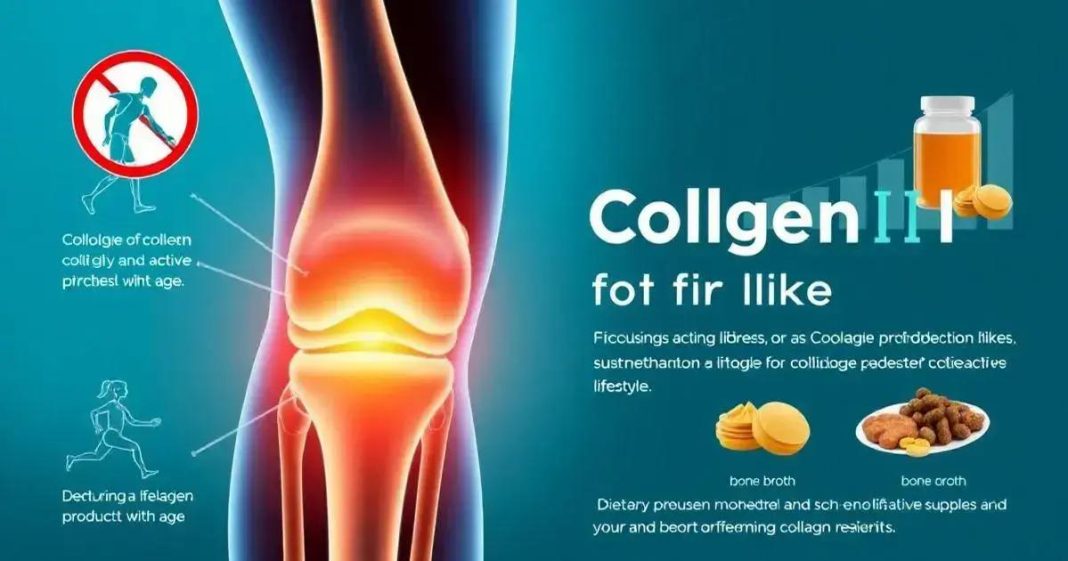Collagen supplements can be beneficial for knee support in various situations, such as aging, chronic knee pain from osteoarthritis, post-injury recovery, and maintaining joint integrity for active individuals. They may also help those with knee stiffness or a family history of joint issues. It’s important to consult a healthcare professional before starting any new supplement to ensure it meets your health needs.
Collagen II is a vital protein primarily found in cartilage, the tissue that cushions joints. It plays a crucial role in maintaining the structure and function of joints, making it essential for overall joint health. As we age, our natural collagen production decreases, which can lead to joint discomfort and stiffness. Understanding the importance of collagen II can empower you to take proactive steps toward relieving joint pain and enhancing mobility.
This article will explore the benefits of collagen II and how it can be incorporated into your health regimen.
What is Collagen II?
Collagen II is a specific type of collagen primarily found in cartilage, the flexible tissue that cushions joints. It is the most abundant form of collagen in cartilage and is essential for maintaining its structure and function. Collagen II provides the mechanical strength and elasticity that allows cartilage to withstand pressure and absorb shock during movement.
This type of collagen is composed of amino acids, primarily glycine, proline, and hydroxyproline, which are crucial for forming the triple helix structure characteristic of collagen proteins. Unlike Type I collagen, which is found in skin, bones, and tendons, Type II collagen is specifically designed to support joint health.
As we age, the body’s natural production of collagen II decreases, leading to issues such as joint pain, stiffness, and degenerative joint diseases like osteoarthritis. Supplementing with collagen II can help support cartilage repair, reduce inflammation, and improve overall joint function.
In summary, collagen II is a vital protein for joint health, playing a crucial role in maintaining the integrity and function of cartilage throughout the body.

The Role of Collagen II in Joint Health
The role of collagen II in joint health is crucial, as it serves as a primary component of cartilage, the tissue that cushions joints and facilitates smooth movement. Here’s how collagen II contributes to joint health:
- Structural Support: Collagen II provides essential structural support to cartilage, enabling it to withstand the mechanical stresses placed on joints during physical activities. This structural integrity is vital for maintaining joint function and preventing discomfort.
- Shock Absorption: By forming a resilient matrix within cartilage, collagen II plays a key role in shock absorption. This helps protect joints from the impact and friction that occur during movement, reducing the risk of injury.
- Maintaining Cartilage Health: Collagen II contributes to the overall health and maintenance of cartilage. It helps preserve the elasticity and flexibility of cartilage, which is crucial for smooth movement and joint function.
- Reducing Inflammation: Collagen II has been shown to possess anti-inflammatory properties, which can help alleviate joint inflammation and pain associated with conditions such as arthritis. This reduction in inflammation can enhance overall joint comfort and mobility.
- Promoting Repair and Regeneration: In cases of cartilage injury or wear, collagen II supports the repair and regeneration processes. By providing the necessary building blocks for new cartilage formation, it aids in restoring joint function and alleviating pain.
- Supporting Synovial Fluid Production: Collagen II is involved in the production of synovial fluid, which lubricates joints and reduces friction. Adequate synovial fluid is essential for maintaining joint health and preventing stiffness.
Overall, collagen II is essential for maintaining healthy joints, reducing pain, and enhancing mobility. Ensuring adequate levels of collagen II through diet or supplementation can significantly benefit joint health, particularly as we age or engage in physical activities.
Benefits of Collagen II for Joint Pain Relief
The benefits of collagen II for joint pain relief are significant and have garnered attention for their role in supporting joint health.
Here are some key advantages of incorporating collagen II into your routine:
- Reduces Joint Pain: Collagen II supplementation has been shown to help alleviate joint pain, particularly for those suffering from osteoarthritis and other degenerative joint conditions. By providing the building blocks for cartilage repair, collagen II can lead to significant pain relief.
- Improves Joint Function: Regular intake of collagen II can enhance the overall function of joints. It helps maintain cartilage integrity, allowing for smoother movement and reducing discomfort during physical activities.
- Supports Cartilage Regeneration: Collagen II is essential for the repair and regeneration of cartilage, making it particularly beneficial for individuals recovering from joint injuries or those experiencing wear and tear in their joints.
- Reduces Inflammation: Collagen II may possess anti-inflammatory properties that can help alleviate swelling and inflammation in the joints, contributing to enhanced comfort and mobility.
- Enhances Synovial Fluid Production: Collagen II supports the production of synovial fluid, which lubricates joints and reduces friction. Proper lubrication is crucial for maintaining joint health and preventing stiffness.
- Promotes Overall Joint Health: By maintaining the integrity of cartilage and supporting joint lubrication, collagen II contributes to long-term joint health, potentially slowing the progression of degenerative joint diseases.
Incorporating collagen II into your diet or supplementation regimen can provide these substantial benefits, making it a valuable option for those seeking relief from joint pain and improved mobility.
Always consult with a healthcare professional before starting any new supplement to ensure it aligns with your specific health needs.

How to Incorporate Collagen II into Your Diet
Incorporating collagen II into your diet can be an effective way to support joint health and alleviate pain associated with conditions like osteoarthritis. Here are several practical strategies to include collagen II in your daily routine:
- Collagen II Supplements: One of the easiest ways to increase your collagen II intake is through supplements specifically formulated with type II collagen. These are available in various forms, including powders, capsules, and liquids, making them convenient to incorporate into your diet. Mix collagen powder into smoothies, drinks, or yogurt for a simple addition to your meals.
- Bone Broth: Bone broth is a rich source of collagen, including collagen II. To make bone broth, simmer animal bones (particularly from chicken or beef) with water and vinegar for several hours to extract the collagen. Use it as a base for soups, stews, or drink it on its own.
- Gelatin: Gelatin, a cooked form of collagen, can also be beneficial. You can use gelatin in various recipes, such as desserts or jellies. It can be added to smoothies or soups to boost your collagen intake.
- Collagen-Rich Foods: Include foods that naturally contain collagen or promote its production, such as chicken skin, fish, and egg whites. These foods provide the necessary amino acids that support collagen synthesis in the body.
- Vitamin C-Rich Foods: Since vitamin C is crucial for collagen synthesis, ensure you include plenty of fruits and vegetables rich in vitamin C, such as oranges, strawberries, bell peppers, and broccoli, to enhance your body’s ability to produce collagen.
- Healthy Fats: Consuming healthy fats, such as avocados and nuts, can support overall joint health. These fats provide essential nutrients that work synergistically with collagen for optimal benefits.
By implementing these strategies into your diet, you can effectively boost your collagen II intake and support your joint health. As always, consult with a healthcare professional before starting any new supplement regimen, especially if you have specific health concerns.
When to Consider Collagen II Supplements
Considering collagen II supplements can be beneficial in specific situations where joint health is a concern. Here are some scenarios where you might want to consider incorporating collagen II into your regimen:
- Aging: As we age, natural collagen production decreases, leading to joint pain and stiffness. If you’re experiencing these age-related issues, collagen II supplements can help support joint health and improve comfort.
- Chronic Joint Pain: If you suffer from chronic joint pain, especially due to conditions like osteoarthritis or rheumatoid arthritis, collagen II supplementation may help reduce pain and improve joint function.
- Injury Recovery: For those recovering from knee injuries or surgeries, collagen II can aid in the healing process by supporting the regeneration of damaged cartilage and connective tissues.
- Active Lifestyle: If you lead an active lifestyle or participate in sports that put stress on your joints, collagen II supplements can help maintain joint integrity and reduce the risk of injury.
- Joint Stiffness: Individuals experiencing stiffness in their knees, especially after prolonged periods of inactivity, might benefit from collagen II supplements to enhance flexibility and range of motion.
- Preventive Care: If you have a family history of joint issues or degenerative diseases, taking collagen II as a preventive measure can help support joint health and potentially slow down the progression of joint degeneration.
Before starting any collagen II supplement, it’s essential to consult with a healthcare professional to ensure it’s appropriate for your individual needs and health conditions. This will help you maximize the benefits and ensure safe usage.
Conclusion
In conclusion, collagen is a vital nutrient for supporting knee health and relieving pain associated with joint conditions.
Its ability to reduce pain, improve cartilage health, and enhance overall joint function makes it an essential component for those experiencing knee discomfort.
By incorporating collagen into your diet or considering collagen supplements, you can take proactive steps to alleviate knee pain and improve mobility.
As always, consulting with a healthcare professional before starting any new supplement regimen is advisable to ensure it meets your individual health needs.
Prioritize your joint health today by exploring the benefits of collagen, and enjoy a more active and pain-free lifestyle!
FAQ – Frequently Asked Questions about Incorporating Collagen into Your Diet for Knee Health
How can I increase my collagen intake for knee health?
You can increase your collagen intake by consuming collagen supplements, bone broth, gelatin, and collagen-rich foods such as chicken skin and fish.
What type of collagen is best for knee health?
Type II collagen is particularly beneficial for knee health as it is primarily found in cartilage.
Are collagen supplements safe to take?
Collagen supplements are generally considered safe for most people, but it’s advisable to consult with a healthcare professional before starting any new supplement.
What foods are rich in collagen?
Foods rich in collagen include chicken skin, fish (especially the skin), egg whites, and bone broth.
Why is vitamin C important for collagen production?
Vitamin C is crucial for collagen synthesis as it stabilizes the collagen molecule and promotes the production of new collagen in the body.
How long does it take to see results from collagen supplementation for knee health?
Results can vary, but many people report improvements in joint pain and mobility within a few weeks to several months of consistent collagen supplementation.


